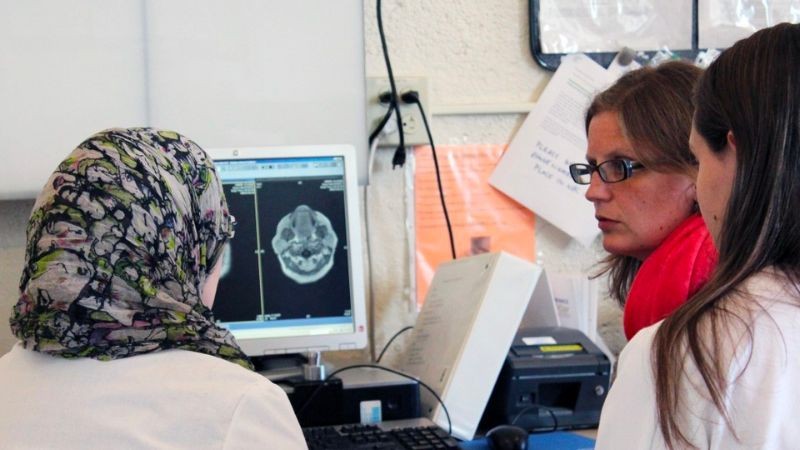Neurology Symposium on September 9-10

There is growing evidence of the increasing burden of emergent neurological conditions in resource-limited settings, and the lack of specialized neurological expertise to manage such patients. In the next decade, there will be increasing reliance on generalist physicians to recognize and appropriately treat acute neurological disorders especially in low and middle income countries. Reduction of disease and disability that are associated with brain and other nervous-system disorders will demand engagement from, and collaboration with, local primary care and the emergency physician medical community.
In that context, the Neurological Institute at Columbia University Medical Center teamed-up with local neurology experts at Universidad de Chile, to conduct an educational symposium on neurological emergencies geared towards generalists and emergency room physicians who frequently manage these critical patients.
In early September, a delegation of four faculty members Columbia Medical Center’s Division of Critical Care and Hospitalist Neurology will visit the country to participate in a ¨Train the Trainer¨ symposium. They are: Kiran T. Thakur, MD, Assistant Professor of the Division of Critical Care and Hospitalist Neurology at the Department of Neurology of Columbia University’s Medical Center; Kathryn Rimmer, MD, Resident at the Adult Neurology Residency Program at the NewYork-Presbyterian Hospital; Sachin Agarwal, MD, MPH, Assistant Professor of Neurology at the NewYork-Presbyterian Hospital; and Shivani Goshal, MD, Assistant Professor of the Division of Critical Care and Hospitalist Neurology at the Department of Neurology of Columbia’s Medical Center.
Chilean partners include Andrea Slachevsky, Associate Professor, and Rodrigo Salinas, Assistant Professor, both from Universidad de Chile’s School of Medicine. In addition, Carlos Romero, President at Chile’s Society of Intensive Medicine (SOCHIMI), will be joining them.
Twenty neurologists from throughout the country, many of them practicing medicine in emergency rooms or in acute care hospitals located in rural regions, will be participating in this event
The symposium will leverage the longstanding expertise and breadth of knowledge in both the Neurological Institute at Columbia University and Universidad de Chile, with up-to-date training on neurological emergencies. It will address the clinical approach and management of major neurological emergencies including acute stroke, subarachnoid hemorrhage, trauma, etc. The educational program objective is to increase the comfort and improve the examination and management skills of physicians in assessing neurologically critically ill patients.
Every year, millions of individuals suffer from acute stroke, the second leading cause of death globally, as well as other neurological emergencies like severe traumatic brain injury, subarachnoid hemorrhage, status epilepticus, and spinal cord injury. These neurological emergencies are particularly devastating, causing significant morbidity and mortality on the global population, as they frequently strike without warning and medical care must be provided as soon as possible. Often in resource limited settings, delays in diagnosis and appropriate management lead to poor outcomes leading to death and or worse when left with permanent and significant neurological deficits.
Chile has a high burden of neurological emergencies with cerebrovascular disease being the leading cause of mortality in the country, with 8,100 deaths annually. The “Explicit Guarantees in Healthcare” (AUGE) program was established by the Chilean government in 2006, which guarantees the treatment of various neurological diseases, such as non-refractory epilepsy, ischemic stroke, subarachnoid hemorrhage, and emergency care for moderate to severe head trauma. Despite the government priorities and high burden of neurological disorders, there is a deficiency of neurologists in the country, with most concentrated in urban areas, working in private practice.